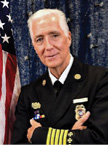Editor’s Opinion ❘ By BOBBY HALTON

You would be hard-pressed to find anyone who did not believe that we should do everything we can to make sure that every single firefighter returns home safe and in relatively the same condition they were in when they came to work that shift or for that call. People who feel otherwise are out there, they are evil, but I know they don’t exist in our profession. The National Fallen Firefighters Foundation has a great slogan, “Everyone Goes Home,” which, incidentally, originated with the F.O.O.L.S. organization, whose original motto stated, “Train Every Day So That Everyone Goes Home.”
Both are wonderful sayings, and their intentions are excellent. The problem comes from the illusive concept of zero—all firefighters know that not everyone comes home all the time. Not everyone, despite how diligently and intensely they train, comes home. That is a consequence of the reality of our dynamically complex profession’s mission, our operating environments, and our purpose. Zero is an admirable commitment but a lousy goal. Understanding zero is a lot more complicated than it seems.
In our dynamically complex work, something happens every time we roll that possibly never happened before along with a wide array of things that routinely happen. Unfortunately, that one idiosyncratic, minute, seemingly insignificant change can make for incredibly different outcomes in fire behavior; building stability; human interaction; and, consequentially, our safety and survival. Accidents or failures are very often just the “normal” outcomes of our work.
The problem with zero or perfection is that it’s almost beyond our ability to comprehend what that really means. In the case of zero, it is the absence of something that we only define by the lack of, or the absence of, something else, safety being a wonderful case in point. When we ask someone to define safety, they routinely say, “When there are no accidents.” No accidents equals safety, or does it?
It’s interesting to think about the effects of having an absolutely honorable commitment that is unattainable. What happens when we fall short of that commitment? How we manage not only the public’s reaction to unexpected outcomes but also our own internalization of failures or personal reactions can make or break an organization and irreparably harm and damage its people.
Zero itself, the idea and its history, in a way, helps us to understand its complexity and its impact on society and the fire service. As we were growing up, most of us never imagined that for a long time in Western civilization the concept of zero just did not exist.
For Western civilization, the concept of zero in general is credited to a 13th-century Italian mathematician named Leonardo of Pisa, most commonly referred to as Fibonacci. Leonardo brought back the Arabic numerals from his travels in North Africa, but scholars debate whether the Aramaic zero was fully understood at this point as we understand it today and was not just a placeholder, a space if you will, a way to differentiate between one number and another.
Historians cite that zero also appears in the Mayan culture around 200 A.D., and again another use of zero as a placeholder is credited to the Samarians some 4,000 years ago, give or take a thousand years, according to scholars. But the most interesting story about zero comes to us from Amir Aczel’s book Finding Zero. In his book, he details a great story of him searching for a tiny artifact deep in the Cambodian jungle that would bring him to the evidence of the first actual use of zero as a numerical feature; it’s well worth reading.
It is important to see where, how, and why we started to think about absence of something as a something. As to safety, Nassim Taleb points out that the absence of evidence is not the evidence of absence. This is why when we look at a bad outcome, we immediately begin to assume that some element of malfeasance occurred. Simply put, someone screwed up or nothing bad would have happened. Then come the demands for accountability; punishment; and, of course, change. But maybe sometimes we should slow down and remember what Paul Chillers said, “You can blame or you can learn, but you can’t do both.”
The issue of the demand for perfection or zero risk is not just our issue as firefighters; it is everywhere. Trying to achieve perfection is a worthy goal. The roots of it go back to the roots of civilization. When bad things happen, we want accountability; we look for reasons, explanations. Our problems with zero make any exceptions seem deviant. So, we get emotional and make assumptions. It is very difficult to stay dispassionate when our expectations are not met, especially when someone gets injured.
We can’t control every outcome; unfortunately, however, with a good system, we can hopefully help to control our reactions. We can try to understand what inputs and understandings at the time made the decision seem correct at the time to those who made it. And perhaps, most importantly, we can, when possible, allow the decision maker or makers themselves to walk us through what led them at the time to make the choices they did. As to zero, good luck; in life, we will always have exceptions to our expectations, especially in firefighting. We will forever study everything we can so we don’t, when possible, repeat a bad path but, just like zero, the amount of differences in every path are infinite—another tough concept to wrap our heads around.


